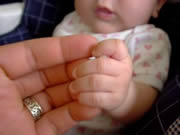Developing Motor Skills - how to help your child with play and hand skills at under 12 months
 The information on this page is also available to download:
The information on this page is also available to download:
During the first year of life baby’s movement and play skills will develop rapidly. Baby needs lots of attention and opportunities to interact with you. They will start to become more independent from you but will need your support and supervision as they develop new skills.
Babies under six months will be more interested in people than in  objects. They will enjoy gentle rocking, bouncing and tickling games. Using cuddles and voices will stimulate them. Bathing and changing times are good for encouraging play.
objects. They will enjoy gentle rocking, bouncing and tickling games. Using cuddles and voices will stimulate them. Bathing and changing times are good for encouraging play.
Baby will start to smile and make contented sounds, this is important to encourage by talking back to baby and making playful sounds.
It is important to encourage your baby’s sense of touch as it begins to reach out, touch and hold objects with help. Baby rattles, wrist rattles, mobiles will all be helpful. Baby mirrors and textured playmates are also good for babies as they begin to explore.
As the baby develops over the 6-month level they begin to use more purposeful movement and enjoy banging and patting toys and surfaces. Early activity toys and centres might be appropriate to introduce to your baby now.
Toys that baby can hold will be more interesting as they begin to hold and look at toys like rattles, stacking rings, plastic or wooden bricks, soft feely toys. Baby gyms can be used with the baby lying on the floor or in a baby seat, toys can be placed close to the child so they can reach and explore with both hands and mouth.
As baby approaches the 12-month age and hand skills begin to develop more the baby will begin to poke and point at objects, use finger tips to explore and pick up smaller objects like pieces of cereal, raisins and cubes of bread.
Toys with safe and smaller features to poke, push and move would also be interesting. There are lots of toys with music and lights, parts to poke and pat.
Babies become interested in putting things in and out of containers like plastic bowls, old shoe boxes and yoghurt tubs. They may enjoy putting things in and out of smaller containers like used water bottles or clean face cream tubs. Exploring in the kitchen cupboard with supervision can be fun. Babies will enjoy having empty plastic jugs, pans and lids, wooden spoons.
Nesting, stacking and toys that have pieces to remove and put back together like cars with play people, pull apart barrels, stacking cups, stickle bricks and magnetic bricks.
Baby will love to play early social games like peek–a–boo, finger games and rhymes. They will also enjoy, making and copying simple babbling sounds. Baby will begin to look at early picture books like vinyl, cloth and card and will enjoy sitting with you as you tell them about the pictures.
Bath time can be used to encourage reaching and grasping with things like sponges, bath activity centres and toys, bubbles, small containers for pouring.
Babies will need to experience different positions for play as they develop their balance and movement skills.
All babies need to spend some time on the floor, perhaps on a mat as they start to move around by rolling, squirming and then crawling.
Encourage the baby to lie on their tummy as you play with them. As they begin to sit help them to prop safely against the sofa, your legs or other sturdy furniture. Use cushions behind and to the side once they have developed some balance. Encourage reaching now by placing toys on the floor or by hanging toys around the baby, to the front and sides.
Encourage the baby to move from the floor into standing by placing toys on low furniture like a footstool or couch and providing the supervision and help needed to develop balance skills.
Although baby walkers are still available they are not recommended as the best way to help your child develop their balance and movement skills. It is better that they experience playing and moving on the floor.

